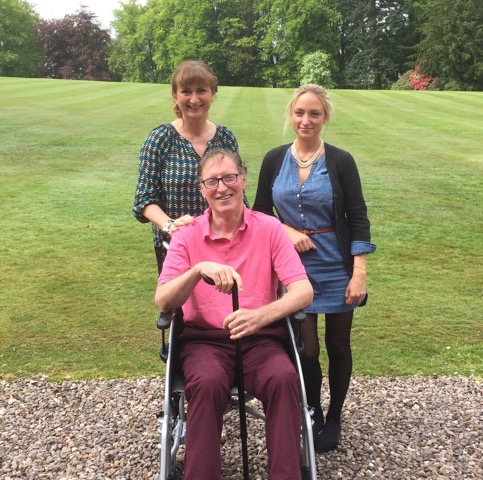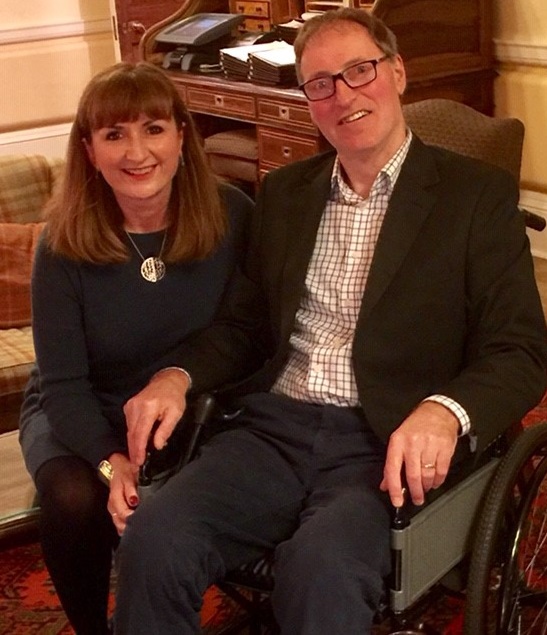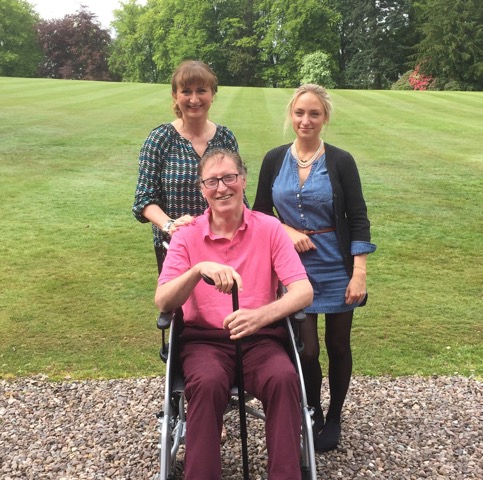What is MND
Find support
I have MND
I am supporting someone
Get involved
Research
About MND Scotland
What’s new?
© MND Scotland 2026
© MND Scotland 2026

 My Carer’s Story – by Elaine Selley
My Carer’s Story – by Elaine SelleyWhere do I start? I had no idea about MND or what a diagnosis would actually mean until my husband, Richard, started investigations for what he thought was an arthritic hand, back in 2014. I had witnessed some clumsiness from Richard the year before as glasses and mugs would plummet to the floor, and on one occasion, I thought he was drunk when he fell trying to get out of the car. While on holiday in Kefalonia he had fallen over taking a picture and at the time we laughed so much as it was like something out of a Laurel and Hardy sketch. Looking back, the disease had been taking a hold two years before we began to realise there was a serious problem. I persuaded him to attend our GP as he just wasn’t quite right.
As in most cases of MND it took over a year to get a diagnosis and in that time I tried to be positive as MND is so rare and there are so many other, less catastrophic illnesses that it could have been. Sadly, Richard was diagnosed with MND four years ago, on 2nd March 2015. We knew this would be the likely diagnosis as we had recently watched ‘The Theory of Everything’ – the film about Stephen Hawking. There were many similarities to what Richard was going through, such as not being able to pick up coins, and tripping over his own feet.
I remember feeling incredibly sorry for the doctors and nurses who had to break this news to us. Doctors enter their profession to cure patients and MND is one of the few diseases left that has no cure. The prognosis was grim. Numbness was my initial feeling, but knowing that I was going to have to be strong for Richard was my overwhelming thought. Throughout our relationship Richard has always put me first and I knew that over the months and years I would slowly lose this very special man who had supported me and given me the confidence to pursue my dreams.
Coming to terms with the fact that I would not be sitting in a bath chair in old age beside my partner was frightening. Screaming at the unfairness in the world whenever I was on a journey in my car was my way of getting rid of all the pent up emotion. Drivers drawing alongside of me must have thought I was a mad woman.To the rest of the world I seemed to be coping but inside I was panicking and scared. Feelings of complete inadequacy in dealing with Richard’s needs were always in my mind, but I knew the desolation that I felt late at night was nothing compared to what he was suffering.
We decided as soon as we knew that we were dealing with a terminal disease that life had to be lived to its absolute capacity. I was about to become a Head Teacher and Richard insisted that I take up the post and give it my all. In the early days we continued to go on holiday. One of the most poignant moments happened while we were visiting Mull. We were having dinner and a lady approached us. She wanted to share that she had been watching us throughout dinner. She had lost her husband the year before and she was trying to create new memories on her own. She had observed us and wanted to say how lovely it was to witness two people who were so obviously in love. It was a wonderful thing to hear but little did this complete stranger know what we had just been forced to come to terms with. There is pathos in real life and not just in fiction.
As it has turned out Richard’s drive and strength of character has meant that he has used his diagnosis to make thousands of people aware of what it is like to live with MND. His positive approach to living with the disease and the way he has embraced the condition means that his legacy is there for all to read about in his blog “Moments with MND’ and his book ‘Death Sits on my Shoulder’. I couldn’t be prouder of everything he has achieved.

I’m naturally a private person and sometimes I found the fact that my life was an open door quite challenging. People tell me I’m strong and confident. Many said they didn’t understand how I could be so positive and calm in the face of so much adversity. Little did they know there were times when I was far from positive or calm. Being constantly busy didn’t give me time to dwell on the negatives and working with the young gave me a sense of energy.
I took early retirement in December 2018 so that I could spend the final stage of MND with Richard. I know this will be the hardest part of the journey but we want to have this time more to ourselves. I now take strength from Richard’s ability to keep his sense of humour. Our humour is often black; we talk about dying, death and funerals. There are no secrets between us about how we feel on any given day. I have black days where I want to scream at the world, as does Richard. I can feel sorry for myself and be angry with the disease for causing Richard to suffer so much. I practise yoga and the reflexology sessions provided by MND Scotland help to keep my mental health in a reasonable state. As the disease has progressed I have realised how important it is to look after my own wellbeing. My life is no longer my own and at times it is like looking after a fully grown new born baby.
Ihave learned an incredible amount in four years. The kindness and compassion shown by so many people keeps our spirits lifted. Richard’s doctors, nurses, carers, friends and family have stood by us throughout every loss. To watch someone you love lose every bit of their independence in just a few years is heartbreaking and exhausting emotionally. However, I see myself as fortunate because I’ve had more time with Richard than many partners get in my situation. I think Richard’s mental strength has helped him survive for so long, but I know that when he has had enough of this life I will let him go without a fight. Sometimes you need to be selfless which isn’t always easy. I’ve been privileged to have been married to this remarkable man and I would be doing him an enormous injustice if I were to give up on living life to the full after he’s gone. There is no place for bitterness or might have beens. I know what will be left is love and respect – no one can ever take that away from me. That stranger in Mull four years ago was right!
Find out how MND Scotland supports carers on our Carers Hub.
Sign up
for newsletter
Get the latest news and events straight to your inbox.
You can help create a world without MND